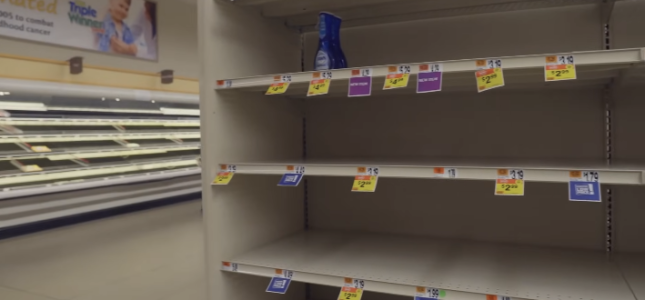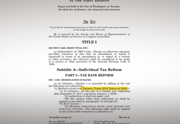Retailers scramble to keep prices steady amid tariff pressure: Are shoppers the ones who pay?
- Replies 0
Retail giants under pressure as tariffs rise: Will customers pay the price?
What shoppers aren’t seeing yet might be what makes all the difference.
As new tariffs take hold and inflation fatigue lingers, some of the country’s largest retailers are scrambling to keep prices steady—and the political spotlight off their backs.
This week, three major chains—Target, Home Depot, and Lowe's—sought to reassure investors and consumers that they’re working behind the scenes to minimize the effects of sweeping tariff increases.
But behind those carefully worded statements is an undeniable financial reality.
Target lowered its financial forecast on Wednesday and made it clear that raising prices due to tariffs is something they want to avoid.
"We have many levers to use in mitigating the impact of tariffs, and price is the very last resort," said Target CEO Brian Cornell during the company’s earnings call.
Among those levers: shifting suppliers, tweaking product assortments, and even changing the timing of purchase orders.

That message mirrored what Home Depot said just a day earlier.
Executives there also downplayed the idea of broad price hikes, though they didn’t rule out select item increases or product changes.
Some items might disappear from store shelves altogether, the company stated, hinting that pricing decisions are becoming a strategic balancing act.
Lowe's also emphasized pricing discipline, telling investors it was committed to staying competitive.
CEO Marvin Ellison said the chain has tools to "manage this in a way that we’re going to minimize any impacts to our customers."
Also read: Tariff plan paused—Trump steps back after market chaos shakes investors
But this unified tone from Target, Home Depot, and Lowe's comes after the White House has made examples of other companies.
Just last week, Walmart said it would have to raise prices this month due to the tariffs.
President Trump responded with a public rebuke, declaring the company should "EAT THE TARIFFS."
Walmart CEO Doug McMillon has since clarified that the company and its suppliers are already absorbing some of the costs.
But as he noted, absorbing the entire impact simply isn’t possible: "given the magnitude of the tariffs."
Meanwhile, Amazon briefly faced administration backlash over concerns it would highlight tariff costs on product listings.
Though the company denied any such plan, the incident culminated in a phone call between Trump and founder Jeff Bezos.
Tensions also rose with toy giant Mattel, after it acknowledged plans to raise prices.
Trump threatened a 100% tariff on the company, warning that "he won't sell one toy in the United States."
Also read: Trade tensions rise between US and Canada—tariff decisions pending
All of this pressure has left other retailers navigating carefully.
They're juggling consumer expectations, shareholder demands, and the threat of becoming political targets.
President Trump has said that foreign countries should pay for the tariffs.
But in practice, it’s American businesses—and potentially their customers—that are footing the bill when imported goods arrive at the border.
Currently, US tariffs on Chinese imports sit at 30%, down from the previous 145%, but global imports now face a fresh 10% tariff.
So far, Target, Home Depot, and Lowe's have stopped short of fully passing on those costs to consumers.
Instead, they’re quietly revisiting product mixes, delaying purchase orders, and looking for alternative sourcing strategies.
But pressures are mounting not just from the government, but from suppliers as well.
Toolmaker Stanley Black & Decker already raised prices once this year and has warned of another price hike ahead.
If suppliers continue pushing costs upward, retailers may soon have fewer options.
At some point, the shelf price may be the only lever left to pull.
Act fast: How tariff changes could affect your online shopping and the loophole to save money!

Do you think retailers can keep prices low without sacrificing quality? Have you noticed changes on your store shelves? Share your thoughts in the comments—your input matters.
What shoppers aren’t seeing yet might be what makes all the difference.
As new tariffs take hold and inflation fatigue lingers, some of the country’s largest retailers are scrambling to keep prices steady—and the political spotlight off their backs.
This week, three major chains—Target, Home Depot, and Lowe's—sought to reassure investors and consumers that they’re working behind the scenes to minimize the effects of sweeping tariff increases.
But behind those carefully worded statements is an undeniable financial reality.
Target lowered its financial forecast on Wednesday and made it clear that raising prices due to tariffs is something they want to avoid.
"We have many levers to use in mitigating the impact of tariffs, and price is the very last resort," said Target CEO Brian Cornell during the company’s earnings call.
Among those levers: shifting suppliers, tweaking product assortments, and even changing the timing of purchase orders.

This week, three major chains sought to reassure investors and consumers that they’re working behind the scenes to minimize the effects of sweeping tariff increases. Image source: Epic Economist / YouTube
That message mirrored what Home Depot said just a day earlier.
Executives there also downplayed the idea of broad price hikes, though they didn’t rule out select item increases or product changes.
Some items might disappear from store shelves altogether, the company stated, hinting that pricing decisions are becoming a strategic balancing act.
Lowe's also emphasized pricing discipline, telling investors it was committed to staying competitive.
CEO Marvin Ellison said the chain has tools to "manage this in a way that we’re going to minimize any impacts to our customers."
Also read: Tariff plan paused—Trump steps back after market chaos shakes investors
But this unified tone from Target, Home Depot, and Lowe's comes after the White House has made examples of other companies.
Just last week, Walmart said it would have to raise prices this month due to the tariffs.
President Trump responded with a public rebuke, declaring the company should "EAT THE TARIFFS."
Walmart CEO Doug McMillon has since clarified that the company and its suppliers are already absorbing some of the costs.
But as he noted, absorbing the entire impact simply isn’t possible: "given the magnitude of the tariffs."
Meanwhile, Amazon briefly faced administration backlash over concerns it would highlight tariff costs on product listings.
Though the company denied any such plan, the incident culminated in a phone call between Trump and founder Jeff Bezos.
Tensions also rose with toy giant Mattel, after it acknowledged plans to raise prices.
Trump threatened a 100% tariff on the company, warning that "he won't sell one toy in the United States."
Also read: Trade tensions rise between US and Canada—tariff decisions pending
All of this pressure has left other retailers navigating carefully.
They're juggling consumer expectations, shareholder demands, and the threat of becoming political targets.
President Trump has said that foreign countries should pay for the tariffs.
But in practice, it’s American businesses—and potentially their customers—that are footing the bill when imported goods arrive at the border.
Currently, US tariffs on Chinese imports sit at 30%, down from the previous 145%, but global imports now face a fresh 10% tariff.
So far, Target, Home Depot, and Lowe's have stopped short of fully passing on those costs to consumers.
Instead, they’re quietly revisiting product mixes, delaying purchase orders, and looking for alternative sourcing strategies.
But pressures are mounting not just from the government, but from suppliers as well.
Toolmaker Stanley Black & Decker already raised prices once this year and has warned of another price hike ahead.
If suppliers continue pushing costs upward, retailers may soon have fewer options.
At some point, the shelf price may be the only lever left to pull.
Act fast: How tariff changes could affect your online shopping and the loophole to save money!
Key Takeaways
- Target, Home Depot, and Lowe's all indicated they are trying to avoid tariff-related price hikes.
- Walmart warned prices may rise, drawing public criticism from President Trump.
- US tariffs on Chinese imports currently stand at 30%, with a new 10% tariff on all global imports.
- Retailers are turning to supply chain shifts and strategic planning to soften the impact for consumers.






